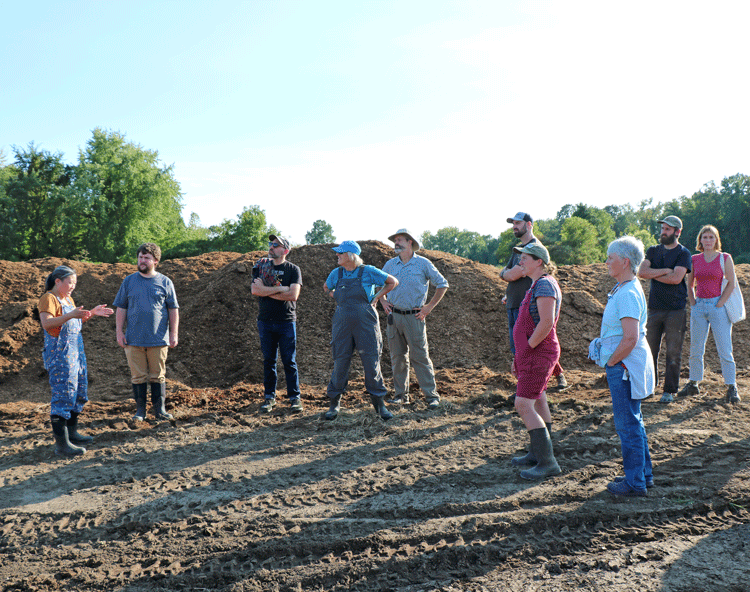The Reed Farm in Sunderland, MA, is owned by first generation farmers Peter Reed Laznicka and Kat H. Chang Laznicka. They run a state-inspected poultry processing facility, which is the only poultry processing plant in Western Massachusetts.
They raise broiler chickens – Cornish crosses – year-round with an occasional batch of ducks on 13.75 acres of APR land. They process approximately 19,000 birds a year, 60% of them being their own birds. The other 40% comprises custom poultry processing services for other Bay State poultry producers. Their chickens are raised on seasonal rotational pasture.
They have been farming at their current location for five years and farming and homesteading on and off for the past decade. Apparently, homesteading is in their DNA. Peter’s mother has a farmstead in Amherst and his great-grandfather, George Xenophon Reed, for whom the farm is named, raised Beltsville turkeys. Kat’s grandfather was a doctor in Korea and grew medicinal plants in his garden.
They applied for and received a CISA Climate Change Adaptation grant to attend the Maine Compost School in October 2022 and to purchase compost test kits and compost thermometers.
The Maine Compost School is the longest continuously running compost program in the U.S. Started in 1997, the school has 1,250 graduates from Maine, the U.S. and 45 countries worldwide, according to the school’s director, Mark King, who also works for Maine DEP.
In 1991, Maine DEP, University of Maine Cooperative Extension, the Department of Agriculture (now the Department of Agriculture, Conservation & Forestry) and the now-defunct Maine State Planning Board started a Maine Composting Team to address the issues of composting as the public’s interest in the practice grew and developed.
“There were a lot of people who didn’t understand composting,” said Mark, who joined the Maine Composting Team in 1993. Those practicing composting faced issues such as producing odors, angry neighbors disturbed by those odors and compost sites attracting rabies vector species like skunks.
At the time, in 1993, “there were a lot of canneries closing with a lot of seafood. Individuals and farmers tried to give it a new home, using it in their fields. We had what was called a ‘seafood crisis,’” Mark said. “We spent four years ‘trying to put out fires.’ Then we developed the Maine Compost School in 1997 to deal with the problems. It became a phenomenon.”

Kat H. Chang Laznicka and Peter Reed Laznicka of Reed Farm (far left) speaking in front of their compost piles during the CISA Climate Change Workshop “Composting for Business Diversification and Climate Change Adaptation at Reed Farm.” Photo by Laura Rodley
Students are taught to compost in such a way that it produces no problems with their neighbors and attracts no animals, but more specifically, graduates have to pass a technical ability certification exam proving they have the skills to compost in a way that’s accepted in all 50 states. Sessions are five days long.
They also offer a carcass and animal mortality management composting program based on student interest.
“Composting is really an important way for people to keep food scraps out of landfills, giving them higher and better uses. People can save excess food as donations in the food hierarchy and feed hungry people or hungry animals,” said Mark.
He stressed that the resulting compost is not fertilizer. “The end result is a soil amendment that improves the soil’s health, the soil’s ability to hold water – which is awesome during drought – feeds microorganisms and improves the physical properties of the soil,” Mark explained.
At the Maine Compost School, Kat and Peter learned more about the science of composting and toured several facilities utilizing different methods for composting.
“Compost is a wonderful way for us to close the loop on our farm. Our poultry production methods include fresh bedding, which results in tons of bedding and chicken manure that are ideal ingredients for compost,” said Kat.
The sides of their approximately 50-foot-long by 14-foot-high compost rows are edged at the bottom (like a sheer cliff) rather than sloped to allow the deepest penetration of oxygen into the rows as possible. The compost is turned by Peter once a week.
“Currently, processing waste goes into a compost dumpster that is regularly picked up. We’re looking into incorporating processing waste into our developing on-farm composting program,” said Kat.
What Peter likes best about their venture is “it’s always a different challenge every day.”
On Sept. 21, they hosted a well-attended CISA Climate Change Workshop, “Composting for Business Diversification and Climate Change Adaptation at Reed Farm.”
“Extreme temperature fluctuation and flooding are serious concerns at our farm because they negatively impact the growth rate and mortality of poultry,” said Kat.
Even with fans blasting on the 74º afternoon, the flock that were viewed on the tour looked hot in their large, airy 5,000-square-foot poultry house with a 16-foot-high ceiling.
What they learned at the Maine Compost School regarding minimizing odors has noticeably been put into practice, as there was no “farm smell” upon approaching the farm and minimal odor standing by the rows that sported a burnt sienna color.
For more information, access reedfarmpoultry.com or composting.org. Farmers in CISA’s catchment area can find more information regarding applying for an adaptation grant by contacting CISA’s Stephen Taranto at stephen@buylocalfood.org by calling 413.665.7100 ext. 17.
by Laura Rodley










Leave A Comment